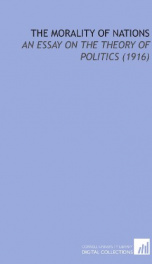greek ideals a study of social life

Text extracted from opening pages of book: GREEK IDEALS A STUDY OF SOCIAL LIFE BY C. DELISLE BURNS AUTHOR OK POLITICAL IDEALS, THE MORA. LITV OF NATIONS, THE WORLD OF STATES,' ETC. SECOND EDITION LONDON G. BELL AND SONS, LTD. 1919 PREFACE THIS book contains no reference which will be new to scholars and no subversively new con clusions drawn from the old evidence. It is an attempt at nothing more than an analysis of some of the ideals which are usually called Greek. And, as will be easily seen, Greek in this sense means Athenian. A short explanation then is needed, both of what is here meant by an ideal and of the limitations here imposed on the word Greek. The life of every people, in so far as it is not simply,' formed by circumstances, is governed by theirs ideals. An ideal is less violent and less uncon-i sidered than a desire or an expectation, and thus it may have less place than passion in moving men to action. But the action to which it moves is pro gressive, whereas the violence of passion or the inconsiderateness of expectation, may destroy almost as often as it urges men forward. 1 An ideal is an emotionally coloured conception of a state of things, 1 which would be better than the present. It is, in av sense, intellectual because it is due to a perception 1 Thucydides, iii, 45. 4 ' Hope and passion are eveiy where, hope leading, passion following, hope devising, desire making us believe good fortune inexhaustible. They work much evil, and though invisible overcome dangers actually seen. VI PREFACE of present evils and future possibilities; but it is not a complete programme for action, for a man influenced by an ideal may often stumble over obstacles to its realization because he has not any definite method of attaining what he desires. On the other hand, an ideal must be emotionally ap preciated. It is not the kind of reality which can be understood by mere calculation or intellectual analysis. It moves because it is desired. 1 But although ideals of every kind originate in the clear thought or deep emotion of individuals, they are powerful only when many are moved by them. The common experience seems to them to produce a common vision. The ideals of which we speak here are pre dominantly moral in the widest sense of that too narrow word. We should, perhaps, apologize for saying little of the position of Art in Greek life: but in the first place our subject must be limited, and, secondly, it is most untrue to the Greek spirit to be rhetorical about Art. The Art of the Greeks coloured all their moral ideals; and yet it was part of their moral ideal not to talk about Art but to produce it. Even of their literature and their philo sophy we shall speak only in so far as these provide evidence of moral ideals which are typically Greek. And now with regard to the word Greek: we shall refer chiefly to Athens in the fifth century; not only because the evidence for that is most 1 Aristotle, Mef., 1072^. 3, Of the activity of the first cause. PREFACE vii complete, but also because what is most typical of the race or culture is to be found there and then. For by typical we do not mean what was most common, but ( a) what was most characteristic and ( b) what was intended half-consciously by many who could not have defined their ideal. In dis cussing the ideal the real Athenians must be taken as a starting-point. But we shall suppose in what follows that the everyday life of Athens is known, at least, in its chief features. It was like ours in some ways; but in more important ways very un like. We shall have to suppose the existence of many different social worlds even in the Athens of the fifth century. There was the Athens of the country-folk, to whom the city was a market or a place of meeting at festivals; the Athens of the traders and merchants, whose point of view is derived from the continual coming and going of the Peiraeus : the Athens of the wealthy few, at whose banquets anybody and everybody might be present: the A --This text refers to the Paperback edition.
Info about the book
Author:
Series:
Unknown
ISBN:
0801477352
Rating:
3.5/5 (2)Your rating:
0/5
Languge:
English
Users who have this book
Users who want this book
What readers are saying
What do you think? Write your own comment on this book!
write a commentGenre
if you like greek ideals a study of social life try:
Do you want to exchange books? It’s EASY!
Get registered and find other users who want to give their favourite books to good hands!






